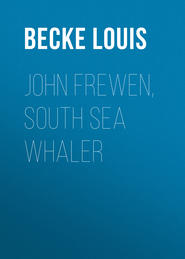По всем вопросам обращайтесь на: info@litportal.ru
(©) 2003-2024.
✖
The Flemmings And "Flash Harry" Of Savait
Настройки чтения
Размер шрифта
Высота строк
Поля
In one instance they had descended upon the unsuspecting inhabitants of the island of Nukulaelae in the Ellice Group, and carried off almost the entire population, and at Easter Island—far to the eastward, over three hundred unfortunate natives were seized under circumstances of the grossest treachery and violence, and manacled together, taken away to end their days as slaves in working the guano deposits on the Chincha Islands, off the coast of South America.
Though not then a rich man, Flemming at his own expense made a long and tedious voyage to the Ghinchas. By the time he arrived there nearly a year had elapsed since the four men had been stolen, and he found that both the British and French Governments had compelled the Peruvian Government to restore all of the wretched survivors—there were but few, alas!—to their homes. Over one hundred of the wretched beings had perished of disease in the hot and stifling holds of the slavers; scores of them, attempting to regain their liberty, had been shot down, and the fearful toil in the guano pits of the Ghincha Islands carried off many more.
At the Chincha Islands he was unable to gain any definite information about the four men, but was told that the British Consul at Gallao might be able to tell him what had become of them—whether they had died or had been among those restored to their homes. So to Gallao be went, for he was ever bearing in mind the grief of his children at the loss of their dear “Tommy Topsail-tie” and “Jacky Waterwitch,” and his promise to them that if they and their Anaa companions were alive he would bring them back.
But a bitter disappointment awaited him at Gallao—for the Consul, who had been largely instrumental in forcing the Peruvian Government to liberate the captured people, gave him absolute proof that none of the four men had reached the Ghinchas, for he had obtained a great deal of information from the survivors, all of which he had carefully recorded.
“Here is what Vili, a native of Nukulaelae, told me, Mr. Flemming. He was one of those who were captured by the barque, and was rather well treated by the captain on account of his speaking English, being put into the mate’s watch as he had been to sea for many years in whale ships. He says:—
‘After we of Nukulaelae had been on board the barque for about twenty days, we came to an island in the Paumotus, where the captain tried to capture two canoes full of natives but failed, though quite soon after he seized four from a boat, and they were carried down into the hold and ironed, for they had fought very hard and all were much hurt and bleeding. I spoke to them and they told me that they had been out fishing with the two sons of a white man, who was a trader on the island. The captain did not hurt the two boys, but let them go. Then a lot of canoes and boats came off and the ship fired her cannons at them, and drove them away.
‘Next day we met another ship, a small schooner, flying the German flag, and her captain came on board our ship and had a long talk with our captain, and presently an officer and six men came down into the hold, and took the irons off nine men and drove them on deck. Among these men were the four who were taken from the boat. The captain of the schooner paid our captain money for them, and took them on board his vessel, which then sailed away.’
“Now, Mr. Flemming,” resumed the Consul, “that is all I can tell you. I have written to the British Consul at Apia in Samoa, and at Levuka in Fiji, asking them to endeavour to find out the schooner’s name and trace the nine men. I have no doubt but that she was some Fijian or Samoan ‘blackbirder,’ and that the poor devils are working on some of the plantations in either Fiji, Samoa or Tonga. There is, therefore, good reason for you to hope that you will succeed in your search. I shall gladly give you all the assistance in my power to facilitate your enquiries.”
Returning to Anaa, Flemming, through the aid of the French authorities in Tahiti, placed himself in communication with the British Consuls in Fiji and Samoa, telling them the details of the capture of the four men and of their transference with five others to another vessel, and enclosing a sum of money—all he could spare—to be given to Tommy Topsail-tie so that he and his three companions might be enabled to find their way back to Anaa.
At the end of another long weary year of hopeful expectation, he received replies from the Consuls, returning the money he had sent, and saying that after most careful inquiries, they could learn nothing of the nine men; but that they (the Consuls) had strong reason to believe that the schooner to which they had been transferred was a notorious German “blackbirder” named the Samoa, though the captain and the crew swore they knew nothing of the matter.
“It is quite possible,” they said in their joint report, “that some or all of the men are on one of the German plantations in Samoa or Tonga, and that you will yet discover them. But the German Consuls will give us no assistance, and absolutely decline to permit us to send any one to visit the plantations, unless the managers or owners are agreeable. And, as you can imagine, the owners and managers are not agreeable, and have declined in terms of great rudeness to even supply us with the names of any of their labourers, or the names of the various islands from which they come.”
But even in face of this Flemming did not despair, and told his wife and children, who could not restrain their tears when they read the Consuls’ report, that he would not let the matter rest. He had several friends in Samoa and Fiji—merchants, traders and ship captains, and to them he wrote asking them to institute enquiries quietly, and let him know the result.
After spending another five years on Anaa, during which time he had heard nothing of the missing men, he determined to settle on Rarotonga, where there was an excellent opportunity of making money. His eldest boy by this time was almost a grown man, and was earning his living as a supercargo of a trading vessel, running between Auckland in New Zealand and the various groups of islands in the South Pacific.
CHAPTER IV
In the quiet little harbour of Mulifanua, situated at the western end of the island of Upolu, a fine-looking brigantine was lying at anchor, and the captain and supercargo were pacing the deck together enjoying their after-breakfast pipes.
The brigantine was the Maori Maid of Auckland, Captain Heselton, and the supercargo was young Robert Flemming. The vessel had run into Mulifanua Harbour owing to her having struck on a reef a few days previously whilst beating up against the south-east trades from Wallis Island to Leone Bay, a port on the island of Tutuila, one of the Samoan Group, and as she was leaking rather seriously her captain decided to run into Mulifanua, put her on the beach, and get at the leak or leaks.
“There is no need for you to stay on board, Bob,” said Heselton presently to his young supercargo. “Go ashore and stay ashore until we are ready for sea again. All going well we’ll find out where the damage is by this time to-morrow, and be afloat again in a few days. But there is nothing to keep you aboard, and you might as well put in your time shooting or otherwise enjoying yourself; why not go and have a look at Goddeffroy’s big plantation? It’s only about a couple of miles away.”
“Thank you, captain, I think I shall. As you know for years past I have always been hoping that during one of our cruises, I might come across some native or other on one of these plantations who might be able to tell me something about those four poor fellows who were collared by that Peruvian barque ten years ago. And this plantation of Goddeffroy’s is one of the biggest in the South Seas—there are over seven hundred labourers, Line Islanders, Solomon Islanders, New Britain niggers and heaven knows what else.”
“Well, you’ll have a good chance now. And look here, Bob—take your time, a day or two more or less doesn’t matter to us. I shall have plenty to do even after I get at this confounded leak. The rigging wants setting up badly, so we may be here any time under a week.”
“Right. I’ll go and have a look at the plantation; and if the manager is a decent sort of a Dutchman he might put me up. If he’s a hog—which he probably is—I’ll go to the native village, sleep there to-night and have a day’s pigeon-shooting to-morrow.”
Just then a boat was seen putting off from the shore, manned by Samoans, but steered by a white man, who as soon as he came on deck introduced himself as the local trader. He was a quiet, good-natured old fellow—an Englishman—and as soon as he learned of the mishap to the brigantine, at once offered to get a gang of natives to assist in beaching her; and then pressed Flemming to make his house his home during the stay of the vessel.
“Thank you,” replied the young man, “I shall be very pleased. I want to have a look at the big plantation here and try to have a yarn with some of the Eingsmill Island labourers.” Then he told the trader, who was much interested, the object he had in view.
“I’m sure that the manager will let you talk to any of the labourers,” he said, “for he’s one of the ‘White men’ kind of Dutchmen. His name is Knorr. He succeeded a regular brute of a man who used to flog the plantation hands right and left. A lot of them have run away during the past six or seven years and have taken to the mountains. They are all armed, and sometimes, when they are in want of food, will lay the Samoan villages under tribute, and if any resistance is shown, they set fire to the houses. The Samoans are terribly afraid of them, for there are two or three cannibal Solomon Islanders among them, and a Samoan has a holy terror of a man-eater.”
“Why don’t the Dutchmen capture the beggars?” asked the captain. “There are enough of them in Samoa.”
The old trader laughed—“Ay, too many, sir; too many for us poor English traders. But they have tried, time and time again, to capture these fellows, but only got badly mauled in two or three fights. There is a standing reward of two hundred dollars for every one of them, dead or alive, and about a year ago ten flash young Samoan manaias[1 - Warriors or rather would-be warriors—young men whom the local white men usually speak of as “bucks,”—i.e., flashy, saucy fellows.] set out, well armed and well primed with grog, to surprise the escapees, who were known to be living in an almost inaccessible part of the mountains. Only four of the ten came back; the other six were shot down one by one as they were climbing the side of a mountain, and these four were made prisoners by the outlaws, who gave them such a fright that they will never get over it. It was as good as any novel to hear them talk about it, I can assure you.”
“Go on, tell us the whole yarn,” said the skipper of the Maori Maid, as he pushed a decanter of brandy towards his visitor, and take a cigar. “It’s pleasant to meet an Englishman in these Dutchman-infested islands, especially when he has a good yarn to spin.”
“The yarn isn’t a pleasant one, captain,” said the trader. “It’s a d–d unpleasant one, but it’s true, sir.”
He lit a cigar and then resumed: “Well, after six of these flash young fellows were shot down, the other four dropped their rifles and cried out, Fia ola! Fia ola! (Quarter! Quarter!) and in a few minutes about a dozen of the escapees made their appearance, took away their rifles and cartridges, and tying their arms behind their backs made them march in front of them up the mountain-side till they came to a bit of a thicket in which were four or five small huts. Telling their prisoners to sit down, half of their number went away, returning in half an hour with the six heads of the men who had been shot.
“Take these heads back with you,” said one of the outlaws, who could speak Samoan, “and tell all Mulifanua that we are strong men. We fear no one, for we have plenty of guns and cartridges, and five hundred men such as you cannot take us. And say to the chief of the village, that on every fourth day, food for us must be brought to the foot of the eastern spur of the mountain. If this be not done, then shall we kill all whom we meet—men, women or children. Now go and tell the man who flogged us that some day we shall cook and eat his head, for we are very strong men.’
“Well, the four poor trembling beggars were liberated, and carrying the six heads of their comrades, they went back, and their story so terrified the people of Mulifanua that no further attempt was ever made to capture the outlaws. And although the Germans don’t know of it, the villagers are to this very day, gentlemen, supplying these dangerous devils with food, and I know for a fact that sometimes two or three of them come down from the mountains and sleep in the village without fear. They have never troubled me; but very often a native boy or girl will come to me and buy a 28-lb. bag of shot, caps and powder, and I know perfectly well that it is for the ‘wild men,’ as the people here call the escaped men. Every one of them has not only a rifle, but a shot-gun as well, for they one night broke into the plantation store and carried off all the rifles and guns they could find.”
“Take care, Bob, that they don’t take some pot shots at you,” said the captain, with a laugh, as his supercargo rose to get ready to go ashore with the trader.
“They would if they thought Mr. Hemming was a German from the plantation,” said the trader, seriously, “so you had better not go too far away when you are shooting, unless you take a native guide with you. For, as I have said before, these men and the people of the village are now, I really believe, in secret friendship, or rather alliance—an alliance born out of terror on one side and savage desperation on the other.”
A few minutes later young Flemming and the trader were being pulled ashore.
CHAPTER V
The German manager of the great plantation proved to be, as the old trader had said, “one of the white-men kind of Dutchmen.” He received the young supercargo most hospitably, and insisted upon his remaining to lunch, and when Flemming told him frankly of the long quest for the four missing men, he at once became deeply sympathetic.
“You shall see every one of the six or seven hundred natives I have working for me, Mr. Flemming. They are all now scattered about in different portions of the plantation, but at five o’clock, when they knock off, I shall have them all mustered. But I am almost certain that you will not find any one of the nine who were transferred from the Peruvian slaver to the German ‘black-birder,’ for I have always taken an interest in these people, and know pretty well from where they all come. My predecessor here was very rough with them—the less I say about him the better—and there is now quite a number of runaways living in the bush. They have defied all efforts to capture them. Who they are, and where they come from, I cannot well tell, for the former manager never kept an accurate account of the numbers of new arrivals brought here by the various labour vessels, nor did he specify in his books, as he should have done, from what particular islands they came. ‘Natives’ he considered to be a sufficient designation, and ‘three years’ or ‘six years’ indicated the time for which they were engaged. He left the identification of themselves and their islands to the captains of the various vessels which, at the end of their time, take them back again.”
“I wonder if it is possible that the four men I am looking for are among the outlaws,” said Flemming.
“Possible, quite possible,” replied the manager, “but you will never be able to see them if they are. The gang is very desperate and determined, and though they have no animus against me personally, they would shoot me, or you, or any white man who attempted to get into communication with them.”
After a little further conversation with the manager, Flemming said he would have a few hours’ pigeon-shooting, returning in time to see the plantation hands mustered. Knorr wished him to take a Samoan guide, but the young man laughingly reminded him that he was half a native himself, and from his infancy almost had been used to wandering about the mountain forests of the islands of Micronesia and Polynesia; so, bidding his host good morning, he shouldered his gun and set off, and in another hour was ascending the first spur of the mountain range, which traverses the island of Upolu from one end to the other.
He had a reason for declining the services of a guide, for he had determined to attempt to reach the outlaws’ refuge, and, at the risk of his life, finding out if Tommy Topsail-tie and Jack Waterwitch were among them. The old trader had told him that one of their number was a very big man, whose legs, back, and neck were tattooed as the Kingsmill Islanders tattoo, and he (Flemming) had formed the idea, since his conversation with the manager of the plantation, that this big man was Binoké—the dear friend of his boyhood’s days, the ever-wanted “Tommy Topsail-tie” of his brother and his sister Medora, the man who, with Jack Waterwitch, had stood to his father and mother in their poverty and distress, and had toiled night and day for them without recompense.
As he walked over the soft carpet of fallen leaves which covered the mountain-side so thickly that no sound came from his footsteps, he listened carefully. He knew that he was proceeding in the right direction for the outlaws’ refuge—the direction the plantation manager had impressed on him to avoid—and after a two hours’ stiff climb he found himself on the summit of the spur and overlooking the harbour. Far below him he could see the Maori Maid being hauled on to the beach, and eight miles away the beautiful little island of Manono lay basking in the sun on a sea of deepest, glorious blue.
Suddenly he heard a sound, a faint, soft creeping on the ground somewhere near him, and he knew that it was the sound of a human footstep, and that he was watched.
He laid down his gun, and stood up and pretended to closely scan the thick, leafy canopy of the mighty trees overhead, as if he were searching for pigeons. Then his voice rang out clearly, and echoed and re-echoed in the grey and silent forest aisles.
“Binoké, Binoké! ‘Tis I! Nobal, Nobal! ‘Tis I who call! Tis I, Papu (Bob), of Anaa! I, who have sought thee long. Binoké! Nohal!”
Then came a sudden rush of feet and brown, naked bodies from all around, and in another moment the young man was almost lifted off hid feet by Tommy Topsail-tie, who, clasping his mighty arms around him, pressed him passionately to his bosom.
“My boy, my boy!… See, ‘tis I, Binoké, thy friend, thy slave, thy Binoké!” and then the savage creature wept as only wild people such as he was weep from excess of joy.
In a few minutes Flemming was hurried along by the friendly hands of six or eight of the “wild men” to their refuge further up on the mountain-side, where he found not only “Jack Waterwitch,” but one of the Anaa natives, who had been carried off ten years before; the other native of Anaa, he was told by Tommy Topsail-tie, had died a year or two previously. There were, he found, twelve natives in all—Topsail-tie, who was their leader, Jack Waterwitch, the Anaa man, four Solomon Islanders, and five others from various islands.
For an hour or more the young man conversed with his old friends, who delightedly agreed to leave their mountain retreat and go on board the brigantine as soon as she was ready to sail. The remaining eight men, however, refused to leave, although Flemming told them that they could all come down from the mountain at night-time, and be very easily stowed away on board, and that even if they were discovered the captain would be able to protect them, should the German manager make any demand for them to be delivered over to him. But all his arguments were in vain—they shook their heads and said that never, again would they go, willingly or unwillingly, upon the deep sea.
Then the supercargo and Topsail-tie made their plans, and after spending another hour or so with the escapees, Flemming shook hands with them all, and guided by Nobal, returned to the base of the mountain.
Here he parted from his companion, who quickly plunged into the forest again, and reached the plantation just as the manager was mustering the plantation hands for his inspection. Not deeming it advisable to tell his host of the discovery he had just made, he yet tried to display as much interest as possible, and after walking up and down the triple rows of men and looking at them rapidly one by one, he said that there was no one of them whom he had ever seen before. Then the manager dismissed the men, and Flemming, thanking him for his kindness, hurried on board and told his story to Captain Heselton.











